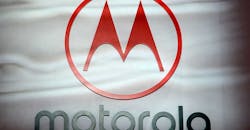Motorola Claims Chinese Rival Had a Double Agent Steal Its Trade Secrets
Motorola Solutions Inc.(IW500/154) told a judge in Chicago that a former employee worked as a double agent who helped Chinese rival Hytera Communications Corp. play catch-up on digital-radio technology for walkie-talkies.
It took decades for Motorola to develop next-generation devices for two-way communication, and Hytera “came along and just took it all,” attorney Adam Alper said Thursday at the start of a trial over the U.S. company’s claim of trade-secret theft. The employee, one of three Motorola engineers hired by Hytera in 2008, downloaded thousands of proprietary documents while still working for Motorola, he said.
“Hytera knowingly took Motorola’s confidential information and used it to create its products,” Alper told the jury.
Hytera’s attorney, Michael Allan, acknowledged the former Motorola employees -- including one that was temporarily on both companies’ payrolls -- were “bad apples,” but he said any transfer of information was minor and inadvertent. Rather than suing the engineers, Motorola waited years to file suit, after Hytera had become more successful, to get more money in damages, Allan said.
“They want every single dollar that Hytera has earned” from the sales of its radios “going back to 2010, plus more,” Allan said.
Motorola, which sued in 2017, claims Hytera stole secret information related to two-way radios used by utility workers, construction crews and school officials. The technology can enable communication even if radio towers aren’t working properly during natural disasters.
Stolen Secrets
The Motorola secrets it says were stolen include hands-free communications, location functionality, emergency alarms for workers in distress and the ability to connect a phone user with a group of radio users.
The case is the latest instance of an American company accusing a Chinese firm of stealing ideas as the Asian nation focuses efforts on transforming itself into a global leader in technology. Complaints about theft of intellectual property have been a key issue in President Donald Trump’s trade war with China.
Motorola’s Alper told jurors that the company developed its two-way radios by 1998, and that a decade later, Hytera still hadn’t caught up. Hytera’s chief executive officer lured one Motorola engineer with the promise of 600,000 shares of Hytera stock, Alper said.
But before leaving, one of the engineers spent three months downloading the documents and source code to take with him, Alper said. During that time, he was also being paid by Hytera without Motorola’s knowledge.
Allan disputed that claim. Hytera had its own prototype that was 75% complete before hiring the men, he said.
The trial before District Judge Charles Norgle is expected to last at least three weeks.
The fight between Motorola Solutions and Hytera spans the globe, with legal cases in the U.S., China, Germany and Australia. Motorola Solutions won an order that limited imports of some Hytera radios, though it didn’t affect current models.
The case is Motorola Solutions Inc. v. Hytera Communications Corp., 17-1973, U.S. District Court for the Northern District of Illinois (Chicago).
About the Author
Bloomberg
Licensed content from Bloomberg, copyright 2016.
